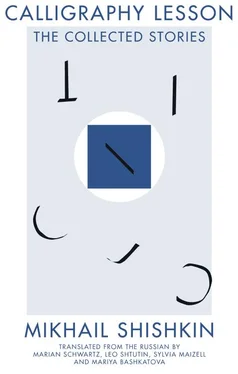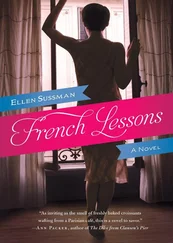Mikhail Shishkin - Calligraphy Lesson
Здесь есть возможность читать онлайн «Mikhail Shishkin - Calligraphy Lesson» весь текст электронной книги совершенно бесплатно (целиком полную версию без сокращений). В некоторых случаях можно слушать аудио, скачать через торрент в формате fb2 и присутствует краткое содержание. Город: Dallas, Год выпуска: 2015, ISBN: 2015, Издательство: Deep Vellum Publishing, Жанр: Современная проза, на английском языке. Описание произведения, (предисловие) а так же отзывы посетителей доступны на портале библиотеки ЛибКат.
- Название:Calligraphy Lesson
- Автор:
- Издательство:Deep Vellum Publishing
- Жанр:
- Год:2015
- Город:Dallas
- ISBN:978-1-941920-02-2
- Рейтинг книги:4 / 5. Голосов: 1
-
Избранное:Добавить в избранное
- Отзывы:
-
Ваша оценка:
- 80
- 1
- 2
- 3
- 4
- 5
Calligraphy Lesson: краткое содержание, описание и аннотация
Предлагаем к чтению аннотацию, описание, краткое содержание или предисловие (зависит от того, что написал сам автор книги «Calligraphy Lesson»). Если вы не нашли необходимую информацию о книге — напишите в комментариях, мы постараемся отыскать её.
Calligraphy Lesson — читать онлайн бесплатно полную книгу (весь текст) целиком
Ниже представлен текст книги, разбитый по страницам. Система сохранения места последней прочитанной страницы, позволяет с удобством читать онлайн бесплатно книгу «Calligraphy Lesson», без необходимости каждый раз заново искать на чём Вы остановились. Поставьте закладку, и сможете в любой момент перейти на страницу, на которой закончили чтение.
Интервал:
Закладка:
It’s very simple, Evgenia Dmitrievna. Here’s a ruler and a Braille board. One—open; two—close. You use this stylus to punch dots in the paper, but only Turkish-fashion, right to left. To read it, you take out the page, turn it over, and read it normally, left to right. Give me your hand. Feel it? One dot on top is A. Two dots one up and down is B. Two dots side by side is C. By the way, Braille also played music. All of Paris went to his concerts. He played cello and organ. But I have my exam in a week. If I end up failing, we’ll be leaving you. I just feel sorry for Mirra Alexandrovna. For some reason she thinks I’m going to be a great musician. Poor, silly mama! I can’t make her understand that the sensitive ear characteristic of every blind person isn’t enough, that that sensitivity doesn’t mean musical ability and true talent is as rare among the blind as among the seeing. I once heard my professor tell someone, “A pointless undertaking, doesn’t have the hands or the feeling. But I’m still hatching. I have kids at home asking for food. I have three, dear.” When we get home, I’m going to get a job as a piano tuner, that’s good, too. If Fate smiles on me, I’ll marry some kind blind girl. What else does happiness require? Normal young women only marry blind men in novels, Evgenia Dmitrievna. And if they do, it’s out of ignorance. To tell you the truth, blind people are awful, Evgenia Dmitrievna. Spoiled, capricious, wronged, vindictive. The blind man’s subordination in human contact is almost continuous; he doesn’t choose his companion, who is whoever wants to be it. The constant dependence is humiliating and has a putrefying effect on the psyche. Egoism and vanity are the main motives for human actions; all that gets magnified exponentially for the blind. The blind man’s vanity is fueled by the exaggerated admiration the seeing express for him out of pity for the cripple. The blind man is always in someone else’s power, so he can’t help but be suspicious, mistrustful, and vindictive. Marrying a blind man is like sacrificing yourself, only the sacrifice is thankless. People won’t understand you anyway. They’ll pity you and sympathize, as if you’d gone into a convent or become a nurse aide. And you won’t be able to explain. So that everything’s going to turn out just fine, Evgenia Dmitrievna. You’ll see.
Zhenya dear, have you gone to bed? Are you asleep? Roman’s going to play a little, just a little, all right? Please forgive us. His exam is soon, and that will be it. The professor said Roman has great talent, that he’ll be a great success. He needs to work. He needs to study hard. Preparing for a performance is very difficult. He has to read the line with one hand and play with the other. Roman is very worried. He puts on a good face and pretends he doesn’t care, but in fact he’s afraid. If he doesn’t get in, Zhenya, it will be a terrible blow for him. Not just a blow—a disaster. You do understand. In his position it is so important to find a place in life, to be essential to someone. Today I’m here, I’m always by his side, but tomorrow he’s alone. How will he live? Who needs him? I think about this all the time, Zhenya. Lord, you look so much like your mama! You know, I should tell you one thing. It’s silly, of course, not worth mentioning, and your dear mama’s long gone, but I can’t get the idea out of my head of how I deceived her. I mean, it wasn’t really a deception, but still. She asked me to sew her a dress, and I promised. We came up with the idea together: a low back and a heart-shaped slit in front. Rustling taffeta with bell sleeves and a full ruffle. Imagine, chiffon ribbons from the fastening on the left and from the side seam on the right tied up in back in a bow. A dream, not a dress. She’d already bought everything: the taffeta, the buttons. I took the material home. You saw me off. You were funny. You said, “Aunt Mika, bring me a wooly-booly!” I promised to bring the dress by her birthday. But I was having so much trouble with Roman, I never got around to the dress. There was never time. I kept putting it off. Of course, I didn’t get it done, and it was time to go. I arrived, I was crying, and I lied that I only remembered on the train—I’d ironed the finished dress, folded it, and forgotten to pack it. She was so upset! Naturally, I would have finished the dress later, but that last time your mama turned up all of a sudden, without warning. She appeared on my doorstep and my first thought was, The dress! But she didn’t remember. Something had happened between her and Dmitry. Or maybe nothing had, she just couldn’t take it anymore. I don’t know how she stood it all. They’d just got married, and he was already very strange. He wouldn’t speak to her for days on end. He’d sit there looking at the wall. I asked, “What’s the matter with him?” But this made her uncomfortable. She smiled and replied, “Pay no attention. Every person needs a wall sometimes.” I didn’t understand their marriage at all. They didn’t know the first thing about each other. Your mother married him in a frenzy. One day she was trying to convince me that Dmitry was an animal, a lewd pig, a narcissistic nonentity, and the next she announced she was getting married. I said, “Are you out of your mind?” She shook her head. “Don’t ask. I know nothing. And I don’t want to.” Mitya didn’t just not love her, it was as if he were taking something out on her. Even having outsiders in the house didn’t stop them. In my presence there were scenes between them at night that would end with Mitya taking the featherbed and going to the kitchen. She’d burst in and shout that she wouldn’t let him treat her this way, that she was putting up with it for the child’s sake, there was a limit to everything, and she would make him listen to her. But Mitya would interrupt her. “Pipe down, you’ll wake Zhenya!” You would wake up and cry, and your father would pick you up. I would try to calm her down, but she was already hysterical. “You don’t need me, I’m just in your way, you need the child, but you hate me! So know this. You won’t have me or Zhenya!” I kept saying, “Leave him! This won’t end well!” But she put up with it, she was waiting for something. At breakfast she would start poking her fork in the butter and could spend half an hour doing that, an hour. It occurred to me that she was quietly losing her mind. On my last visits her feelings toward you seemed to have changed. The slightest thing irritated her. The minute you acted up at the table, she’d start shouting, smacking you in the face, and pinching you so hard she’d leave bruises. You would cry, of course, and she would hit you even harder. “Quiet! Be quiet!” Then she’d clutch her head, cover her ears, and run away. One time you put on her hat, gloves, and shoes, draped yourself in her beads, took her rings, and smeared on her lipstick—and she lunged at you with a bamboo ski pole from your kiddie skis. We barely got her arms twisted behind her back that time.
I found out you’d arrived, my kind Alexei Pavlovich, and rushed off to the vivarium like a woman possessed. I made my way there as if sleepwalking, not myself, which was why I knew I was just about to see you, and suddenly a degenerate old cesspit of a woman approached me at a streetcar stop. She had blue prison tattoos on her arms and even her forehead. She wanted me to buy withered roses from her—lifted, obviously, from the statue of Gogol on the boulevard. “Buy them, girlie,” she wheedled, “for good luck. You’ll see, they’ll come back to life.” What did I do? I gave her a ruble, which the crone doubtless spent on drink, and immediately I felt that the witch, who stank of prison, had not in fact misled me and I was perfectly happy. Fool that I am, at that minute, at that stop, I would have happily died before the streetcar came. I stood and smiled, not in my right mind, and kept bringing the wilted fragrance to my nostrils and sniffing. When I arrived, some people were there. You were angry, excited, not yourself. You were shouting that they were all idlers and thieves, that you couldn’t leave for a minute, that you knew everything: they were feeding the dogs dog meat, and you knew where the meat allotted for them was going. For a long time you couldn’t calm down, you kept snatching walnuts from the bag left over from the monkeys, squeezing three at a time, and the walnuts cracked, shooting off rotten dust. You started in again about how the nuts were dog shit, not nuts. Then someone came to see you and I slipped out because I didn’t want to see you like that. They were drowning puppies there. Having nothing to do to keep me busy, I started helping. I’d pour water into the bucket, toss in the pups, and insert a second bucket into the first, also filled with water. I walked past the croaking jugs again for the umpteenth time, between the stands of trays where the white, sharp-clawed blobs bred faster than they could be done in. The dogs would quiet down and then the howling would start up from all the cages. Finally we were alone. I said, “Thanks for the postcard.” You pretended you didn’t know what I was talking about. “What postcard?” You held me in your arms and started kissing me. I asked whether you believed that we’d have to answer for all our actions on Judgment Day, and you said, “Let’s go before someone else shows up.” You pulled me by the arm, and we crawled into the farthest dog cage, where we put down straw. From directly above us came the barking of crazed canines trying to poke their snouts through the bars and sputtering spit. The sight of bloody cotton wool bothered you. You mumbled, “Zhenya, this can’t be good.” I objected, “It’s fine.” I reached under your shirt and ran my hands over your back and shoulders, feeling the tiny moles. You startled a few times—you kept thinking someone was coming. When they did come from the department to pick up frogs, you had a pleased look on your face, that you’d had time. I said in parting, “I’m going to go to your house to pay Vera Lvovna a visit. Say hello for me.” You mumbled, frightened, “Zhenya, I beg of you, don’t. Don’t come! I can’t take it when you’re together. It’s awful for me.” At home, at dinner, I upset the sauceboat by accident and it all spilled in Mika’s lap. She jumped up, waved her arms around, wailed about how I’d ruined her suit on purpose because I always did everything to be mean, because God created me bad and ugly, with a face to stop a clock, and now here I was having my revenge for being an unattractive nobody. I said that Mika was trash because she wanted to marry my father and I was in the way. My father jumped up and slapped my cheek. I said, “I hate you all!” and ran out. I wanted ice cream but I had to make do with snow. Braille isn’t nearly as clever as it seems at first glance. Here, this is about me and you:
Читать дальшеИнтервал:
Закладка:
Похожие книги на «Calligraphy Lesson»
Представляем Вашему вниманию похожие книги на «Calligraphy Lesson» списком для выбора. Мы отобрали схожую по названию и смыслу литературу в надежде предоставить читателям больше вариантов отыскать новые, интересные, ещё непрочитанные произведения.
Обсуждение, отзывы о книге «Calligraphy Lesson» и просто собственные мнения читателей. Оставьте ваши комментарии, напишите, что Вы думаете о произведении, его смысле или главных героях. Укажите что конкретно понравилось, а что нет, и почему Вы так считаете.












